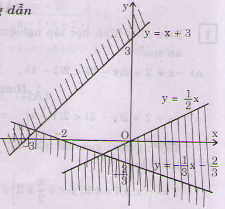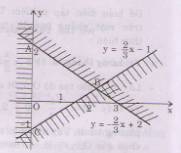Hãy nhập câu hỏi của bạn vào đây, nếu là tài khoản VIP, bạn sẽ được ưu tiên trả lời.

a) \(\left\{{}\begin{matrix}2x-1\le0\\-3x+5< 0\end{matrix}\right.\)\(\Leftrightarrow\left\{{}\begin{matrix}x\le\dfrac{1}{2}\\x>\dfrac{5}{3}\end{matrix}\right.\)\(\Leftrightarrow x\in\varnothing\).
b) Vẽ hai đường thẳng \(y=3;2x-3y+1=0\).
Vì điểm \(O\left(0;0\right)\) có tọa độ thỏa mãn bất phương trình \(2x-3y+1>0\) và không thỏa mãn bất phương trình \(3-y< 0\) nên phần không tô màu là miền nghiệm của hệ bất phương trình: \(\left\{{}\begin{matrix}3-y< 0\\2x-3y+1>0\end{matrix}\right.\).
TenAnh1
TenAnh1
A = (-4.34, -5.96)
A = (-4.34, -5.96)
A = (-4.34, -5.96)
B = (11.02, -5.96)
B = (11.02, -5.96)
B = (11.02, -5.96)

a: Đặt |x-6|=a, |y+1|=b
Theo đề, ta có hệ phương trình:
\(\left\{{}\begin{matrix}2a+3b=5\\5a-4b=1\end{matrix}\right.\Leftrightarrow\left\{{}\begin{matrix}a=1\\b=1\end{matrix}\right.\)
=>|x-6|=1 và |y+1|=1
\(\Leftrightarrow\left\{{}\begin{matrix}x\in\left\{7;5\right\}\\y\in\left\{0;-2\right\}\end{matrix}\right.\)
b: Đặt |x+y|=a, |x-y|=b
Theo đề, ta có: \(\left\{{}\begin{matrix}2a-b=19\\3a+2b=17\end{matrix}\right.\Leftrightarrow\left\{{}\begin{matrix}a=\dfrac{55}{7}\\b=-\dfrac{23}{7}\left(loại\right)\end{matrix}\right.\)
=>HPTVN
c: Đặt |x+y|=a, |x-y|=b
Theo đề ta có: \(\left\{{}\begin{matrix}4a+3b=8\\3a-5b=6\end{matrix}\right.\Leftrightarrow\left\{{}\begin{matrix}a=2\\b=0\end{matrix}\right.\)
=>|x+y|=2 và x=y
=>|2x|=2 và x=y
=>x=y=1 hoặc x=y=-1

1,\(\left\{{}\begin{matrix}x=y^2-1\\\sqrt{y^2+3}+y^2-1=2\end{matrix}\right.\)
\(\Leftrightarrow\left\{{}\begin{matrix}x=y^2-1\\\sqrt{y^2+3}+y^2+3-6=0\end{matrix}\right.\)
\(\Leftrightarrow\left\{{}\begin{matrix}x=y^2-1\\\left(\sqrt{y^2+3}-2\right)\left(\sqrt{y^2+3}+3\right)=0\end{matrix}\right.\)
\(\Leftrightarrow\left\{{}\begin{matrix}x=y^2-1=0\\y^2=1\end{matrix}\right.\)\(\Leftrightarrow\left\{{}\begin{matrix}x=0\\y=\pm1\end{matrix}\right.\)

a)
\(\left\{{}\begin{matrix}x^2\ge\dfrac{1}{4}\left(1\right)\\x^2-x\le0\left(2\right)\end{matrix}\right.\)
\(\left(1\right)x^2-0,25\Leftrightarrow\left[{}\begin{matrix}x\le-\dfrac{1}{2}\\x\ge\dfrac{1}{2}\end{matrix}\right.\)
(2)\(x^2-x\le\) \(\Leftrightarrow0\le x\le1\)
Kết hợp (1) và (2) \(\Rightarrow\dfrac{1}{2}\le x\le1\)
b)
\(\left\{{}\begin{matrix}\left(x-1\right)\left(2x+3\right)>0\left(1\right)\\\left(x-4\right)\left(x+\dfrac{1}{4}\right)\le0\left(2\right)\end{matrix}\right.\)
Giải: \(\left(1\right)\left(x-1\right)\left(2x+3\right)>0\Leftrightarrow\left[{}\begin{matrix}x< -\dfrac{3}{2}\\x>1\end{matrix}\right.\)
Giải: (2) \(\left(x-4\right)\left(x+\dfrac{1}{4}\right)< 0\Leftrightarrow-\dfrac{1}{4}\le x\le4\)
Kết hợp điều kiện của (1) và (2) ta có: (1;4] là nghiệm của hệ bất phương trình.

a) <=>
Miền nghiệm của hệ bất phương trình là miền không bị gạch sọc ở hình bên (không kể các điểm).

b) <=>
Miền nghiệm của hệ bất phương trình là miền tam giác ABC bao gồm cả các điểm trên cạnh AC và cạnh BC (không kể các điểm của cạnh AB).
